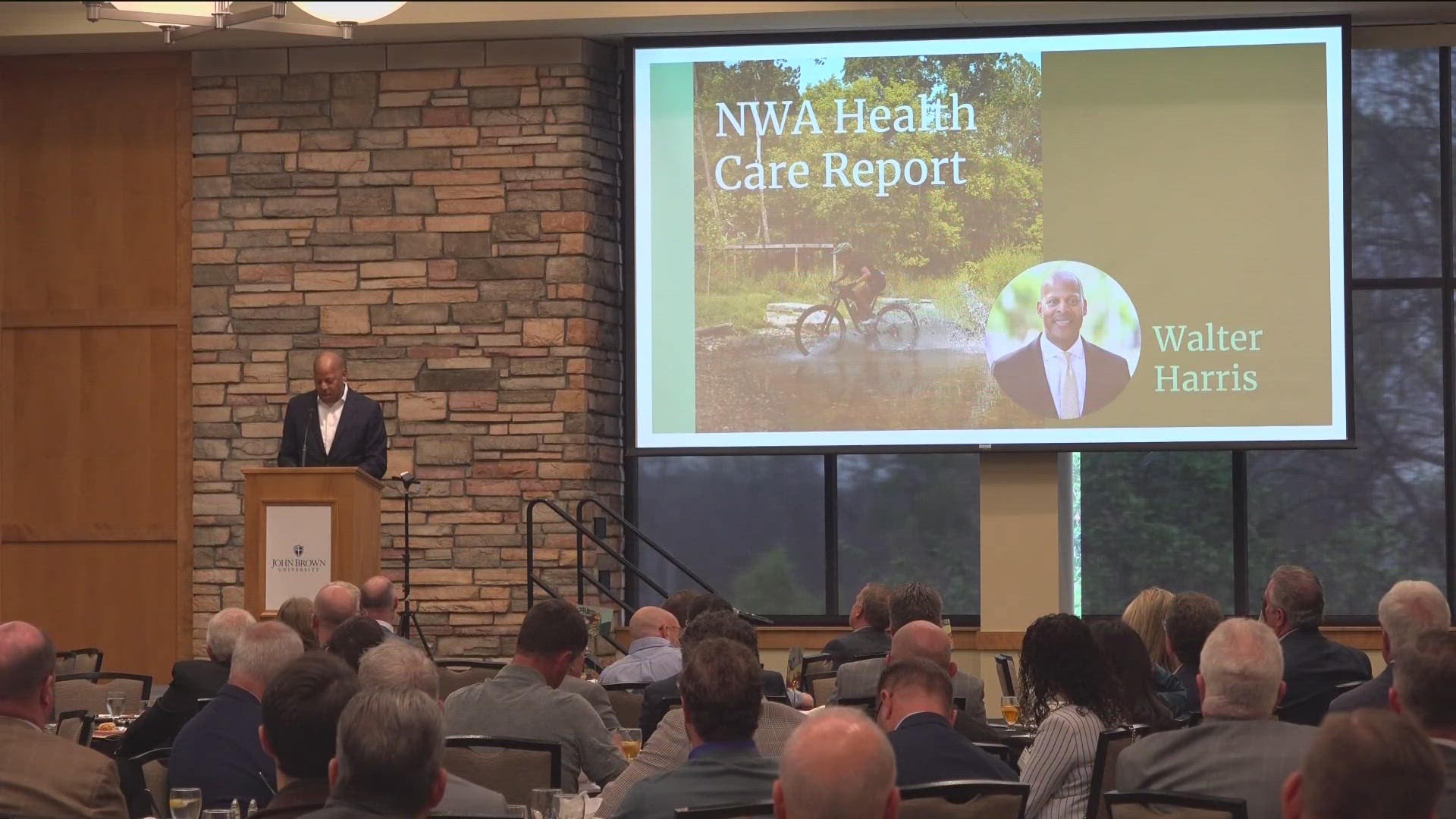SILOAM SPRINGS, Ark. — Northwest Arkansas leaders gathered at John Brown University on Nov 13 for NWA Council's Annual meeting discussing the state of the region and what the future may bring.
The meeting featured the release of the group's annual report and the “Northwest Arkansas Health Care Vision 2030: Continuing the Transformation." The NWA Council and Heartland Whole Health Institute released the report conducted by Tripp Umbach, outlining progress and future goals for health care in the region.
Paul Umbach is the founder and president of Tripp Umbach. He said since his initial report in 2018, the NWA Council took action in creating the Health Care Transformation Division. It gathered local healthcare leaders to discuss the area's issues.
Umbach's study found that patients seeking out-of-region care, or "patient outmigration," reduced from nearly $1 billion in 2018 to $695 million in 2023.
"The new Northwest Children's is a great example of how children from this area had to go out of the market, but now they can stay in the market, and people from close by are coming into the market for pediatric care," Umbach said.
NWA Council President and CEO Nelson Peacock explained that the healthcare sector has outpaced the overall regional economic growth, with its gross regional product (GRP) increasing by 80% from 2018 to 2023, outpacing the overall regional economic growth of 37%. Tripp Umbach estimated the sector could reach $6.1 billion by 2030, representing a 144% growth rate.
The study outlined some challenges in the healthcare system that the region could improve on over the next five years. Tripp Umbach found a workforce shortage, a need for specialty healthcare, and a regional need for a Level 1 trauma center. This all while the state ranks low health-wise and for reimbursement in the country.
"For some reason, the United States gives the smallest amount of money to Arkansas of any other state. So the health care practitioners like doctors and the health care organizations and systems like Washington regional and Mercy have 30% less money to work with," Umbach explained.
"With an annual influx of 15,000 new residents, health care providers grapple with the strain of meeting increasing health care demands. Staffing shortages, worsened by pandemic-related burnout, present a critical issue as the region struggles to recruit and retain doctors, nurses, and other healthcare professionals. Rising labor and supply costs—some increasing as much as 60% since the pandemic—compound these workforce shortages," Tripp Umbach's study stated.
The Vision 2030 report presented four strategies to improve Northwest Arkansas' healthcare system. Their press release lists the strategies as follows:
- Advance Value-Based Payment and Health Policy Reform: Advocate for higher reimbursement rates and a value-based care model that prioritizes patient outcomes. This effort aims to ensure the financial sustainability of healthcare providers while improving quality and reducing overall costs. Engaging employers and policy stakeholders is critical to this transformation.
- Expand Health Care Specialty Services: Develop centers of excellence and attract research-based subspecialists to further reduce outmigration and establish Northwest Arkansas as a destination for advanced, high-quality care. This includes building partnerships for specialized medical programs and developing a Level I trauma center to meet the needs of a rapidly growing population.
- Expand the Health Care Workforce: Invest in graduate medical education (GME) through Washington Regional Medical Center and the University of Arkansas for Medical Sciences (UAMS) Northwest to increase the number of locally trained physicians. Alice L. Walton School of Medicine, opening in July 2025, will complement these efforts by focusing on whole health principles, ensuring a robust pipeline of medical talent.
- Foster a Collaborative Health Care Research and Innovation Ecosystem: Strengthen research partnerships and increase biomedical research funding. The establishment of the Institute for Integrative and Innovative Research (I³R) at the University of Arkansas is positioning Northwest Arkansas as a hub for cutting-edge healthcare research, attracting talent and fostering innovation.
“Reducing patient outmigration by $255 million is a testament to the collaborative efforts of our Health Care Transformation Division," Peacock said in a release. “I want to thank all members of the division for their dedication and hard work. Collaboration has been, and will continue to be, the key to achieving our vision of a value-based, patient-centered healthcare system. We have set a strong foundation over the last five years, but there is much more work needed to reach our goal of becoming a healthcare destination.”
Walter Harris, president and CEO of Heartland Whole Health Institute, added the following in their release, “The transition to value-based care represents a transformative opportunity to improve health outcomes and lower costs. By focusing on preventive and holistic care, we can elevate healthcare delivery across the region. However, this vision requires strategic investment and policy changes to address existing gaps.”
The NWA Council explained, "Vision 2030 serves as a call to action for continued collaboration and investment to make Northwest Arkansas a premier destination for high-quality, innovative health care."
"I think the big issue is really advocacy and communicating to the federal government and to the state government with a single voice and strong collaboration between all of the different players. I think the region has to speak with a voice and has to communicate clearly what the needs are," Umbach said.
For more information and to read the full report, click here.
Watch 5NEWS on YouTube.
Download the 5NEWS app on your smartphone:
Stream 5NEWS 24/7 on the 5+ app: How to watch the 5+ app on your streaming device
To report a typo or grammatical error, please email KFSMDigitalTeam@tegna.com and detail which story you're referring to.

